20 Years FSFE: Interview with Nico Rikken on country teams' activities
In our fifth birthday publication we are interviewing Nico Rikken,
and we focus on the FSFE Netherlands country team. Through our
discussion you can also get a glimpse of how FSFE country teams
work. And if there is no FSFE team in your country, this is a great
opportunity for you to see how one forms.
Nico Rikken, an electrical engineer and programmer, is one of the
Coordinators of the FSFE Netherlands country team.
His interest in technology, combined with his
appreciation for community and disdain for central control, led him
to the FSFE in 2014. Since then, he has helped the FSFE with his
technical skills while contributing greatly to community building.
With this interview, you do not only get to meet Nico Rikken, but
also the FSFE Netherlands country team.
Interview with Nico Rikken
FSFE: Do you remember the first contact you had with the
FSFE? How did it evolve from there?
Nico Rikken: I do remember most of my
'firsts' I had with the FSFE. Strictly my first contact was
reading the FSFE website and becoming a Fellow (the construct at
that time). But after this quite formal arrangement I was looking
for more informal contact and a feeling of community. So I still
have good memories how Felix Stegerman, then Deputy Coordinator
Netherlands, invited me to the Linux Nijmegen User Group to
get to know each other and learn more about the FSFE. Up until that
evening my efforts in Free Software were a solo effort and that
changed in that evening. I became part of a larger community of
like-minded people, thanks to Felix.
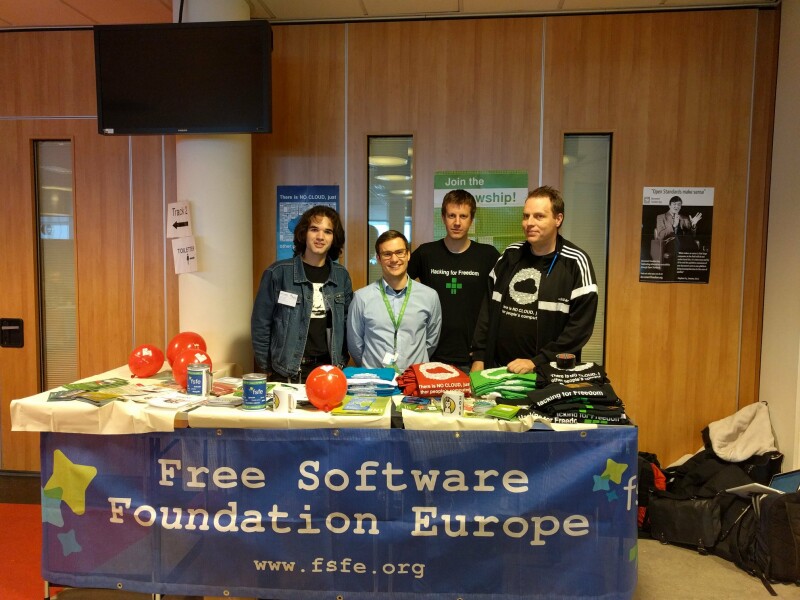
FSFE booth at T-Dose. The Netherlands, 2016.
Up until that evening my efforts in Free Software were a solo
effort and that changed in that evening. I became part of a larger
community of like-minded people, thanks to Felix.
Later that year I attended my first Free Software conference, T-Dose, and a few
months later my first FOSDEM. From there my FSFE journey evolved
with events, booths, presentations, community events, political
efforts, and meeting ever more community members along the way. In
2019, André and I took over Coordinatorship from Maurice Verheesen
and Felix with the goal to give a new impulse to the local group.
We have a growing group of active supporters with multiple ongoing
activities, which I feel proud to be a part of.
Together with André Ockers you coordinate the FSFE's country
team in the Netherlands. Can you describe to us a typical month
in terms of activities and engagement within the
community?
Since the pandemic, the monthly online get-together has become the
heartbeat of the Netherlands country team. The lack of travel has
enabled us to meet more frequently and have a great attendance.
Before we would meet in the center of the Netherlands at the NLLGG
Linux User Group, but that required travel and so the turnout was
quite low. During our online get-togethers, we discuss a variety of
topics, from recent news and personal findings, to more strategic
opportunities to present the topic of Free Software, and ongoing
efforts. André and I facilitate by acting as a bridge to the rest
of the FSFE and to other organizations.
In the last months we have seen rising demands
for digital autonomy in the Netherlands followed by positive
developments regarding Router Freedom. How do you see these
developments? What was the role of the FSFE Netherlands
country team?
I'm very concerned about the lack of Free Software and Open
Hardware adoption in the Netherlands, and the whole of Europe and
the world for that matter. Increasingly we rely on computer systems
rather than humans. This automation does bring a lot of benefits,
but also comes with risks of losing transparency, losing privacy, and
centralizing control. With the wide-scale adoption of cloud
services, AI, and algorithms and an increase in cyber attacks, more
and more people become aware of the need for better solutions and
more regulation. I see Free Software, Open Standards, and Open
Hardware as ways to improve technology itself and the social
structures around it, and so I think we need more of them and they
need to be prioritized by our governments.
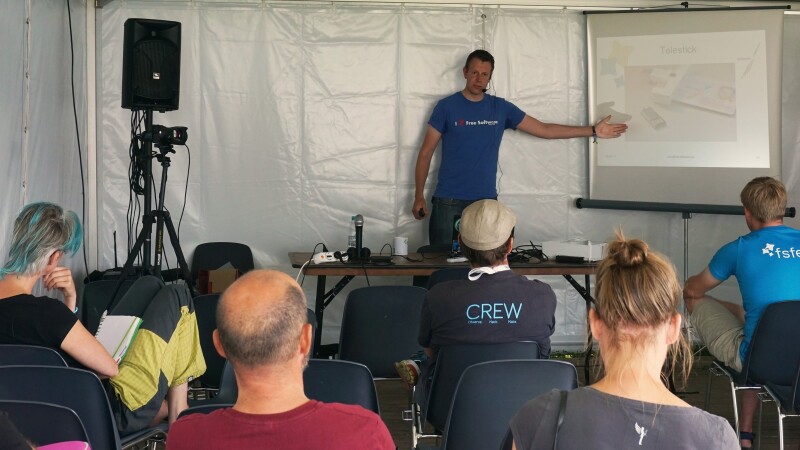
Nico Rikken, FSFE Netherlands team coordinator, talks about
Free Software in the Dutch public sector
at Still Hacking Anyway. The Netherlands, 2017.
I see Free Software, Open Standards, and Open Hardware as ways to
improve technology itself and the social structures around it, and
so I think we need more of them and they need to be prioritized by our
governments.
The issue of the Netherlands (citizens, companies, and government)
becoming too reliant on specific vendors and solutions is not new
and has been discussed many times over the last years. In that sense,
this report
by the Dutch Cyber Security Council was just another call for
change. As this report comes from an organization closer to
government and the call has urgency to it, hopefully we will see
some more action from companies and government. When called upon to
vote, Dutch PM's generally are in favor of adopting Open
Standards and Free Software, but in practice it is low on the
priority list and so the government is not held accountable to
follow up. The role of the country team in this
respect is limited. Rijk Ravestein wrote an article reviewing the
report and suggesting the adoption of Free Software as a viable
solution to this issue. Outside of the article, we have been
speaking with various government bodies on the topic of Free
Software to highlight opportunities and discuss ways to improve the
situation. I find it important that we not only follow the
developments critically but that we also constructively engage in
discussions where we can.
The topic of router freedom is quite different. The Router Freedom
campaign has made our members take a closer look at the situation in
the Netherlands. This included André writing Internet Service
Providers (ISP's) about their practices and Kevin Keijzer
informing us how router freedom works out for him in practice. Kevin
has some of his findings documented on his wiki page. Router
Freedom in the Netherlands in practice wasn't too bad, but
there are now stronger guarantees in
place. I think the practical freedom that was already in place stems
from the tech-savvy community in the Netherlands that would already
install their own router rather than the one provided by the ISP.
These new more formal guarantees can be attributed to the lobbying
of the FSFE in Europe and not to the country team in the
Netherlands. The FSFE contributed to the BEREC Guidelines on the
Implementation of the Open Internet Regulation, which were quoted as
the reason for the new rules. In the Netherlands, we missed the
opportunity of the consultation on the new rules
as this was not on our news radar. The consultation was
mostly by ISP's opposing the new rules, but regardless the rules
were put in place in accordance with the BEREC Guidelines.
What do you see as the most rewarding activities or biggest
achievements of the Dutch team?
This question is difficult to answer because our activities have
been diverse and some have been in collaboration with people
outside of the country team. I think our biggest achievement has
been the level of translation of the FSFE website and marketing
material. André has been a persistent translator and together with
other valued contributions from other community members we now have
most of the information material and news in Dutch for an increased
reach and impact.
I think our biggest impact came from our involvement with the
recent court case by Jos van den Oever about getting the source
code of the Debat
Direct App. This was not strictly a country team effort, but we
were involved and also got support from the FSFE. The final verdict
didn't result in public source code, but through the court case
Jos showed that source code can be requested via a Freedom Of
Information (FOI) request. The success will depend on the specific
situation and country-specific implementation of the EU directive.
Inspired by this request, Daniel Joffe has also filed a request for
source code and I'm pretty sure this will not be the last legal
request for source code in the Netherlands.

FSFE spot in a non-profit hacker camp. The Netherlands, 2017.
What would you say are peculiar factors that challenge or
facilitate the advance of Free Software in the Netherlands?
Please take my answer with a pinch of salt, as this comes down to
personal convictions and generalizations. I think for a start the
broader tech-savvy community in the Netherlands is helpful. There
are plenty of system administrators and programmers who value
control over technology from a do-it-yourself perspective and so
have an inherent preference for Free Software, Open Standards, and
solutions that protect user privacy. This group follows
developments or regulation and company offerings with a critical
eye on forums like Tweakers or
technology podcasts which helps move forward the discussion on
these FSFE-related topics. There is also a smaller but active group
that shares our concerns from an ethical non-technical perspective
by questioning our reliance on big tech and the privacy violations
that typically go along with it. Both groups move the debate of
user control and digital sovereignty forward and nudge politics,
government, and companies in the right direction.
I think this critical view on technology is strengthened on the
level of the European Union where these countries align and do
favor a more strategic play for which Free Software makes a lot of
sense.
Possibly our biggest factor is our participation in the European
Union, as it seems to me that the European Union has more capacity
to develop policies to protect civil rights and regulate digital
infrastructure. On a national level this topic doesn't win deciding
votes in the election, so it is hardly discussed in public. Also
there is a general lack of knowledge about technology and its
social constructs in parliament to question current policy and
develop a new one. I get the impression that a large part of the IT
solutions in the Netherlands are centered around US vendors. And so
regulations that prevent companies storing private information in
the USA are considered a burden on companies, rather than a good
safeguard for the general public. My impression is that it is more
common in France and Germany to question offerings by US vendors
and to prefer national offerings. These regulations do not directly
relate to the adoption of Free Software, but I do think that
questioning the ethics of offerings and valuing digital sovereignty
are the moral grounds which fit well with Free Software. I think
this critical view on technology is strengthened on the level of
the European Union where these countries align and do favor a more
strategic play for which Free Software makes a lot of sense. In
that sense I think the European Union is also advancing Free
Software in the Netherlands.
How can people start participating in the Dutch team? Can you
share some examples of how the existing members found out about
the FSFE Netherlands country team?
The easiest is to join the conversation on XMPP or our online
get-togethers and align with our efforts there. We do have a mailing list
but in practice it is only used for announcements. As we are all
volunteers, I think it is important that our supporters do what they
enjoy doing. Most of us have our own topics and efforts we work on,
and the country team is a way to align and get support. As with
any work, formulating concrete steps and delegating work to others
can be a challenge. So I think there is an opportunity for more
collaboration between supporters on certain topics and hopefully
that will grow in the future when we gain more experience
working together.
I have asked around and it seems our stories of joining the country
team are quite similar. People somehow gained in interest in Free
Software and found the FSFE as the designated party to uphold these
values in Europe. Then they found out about the NL country team,
joined the mailing list and attended a physical meeting. André also
met Felix at Linux Nijmegen as it was close to him, but for Kevin
living on the other side of the country the T-Dose conference was
the first time to physically meet the community. If anything I
think it highlights the importance of letting people know you exist as a
local team, being open to newcomers, and making it easy to join
community meetings.
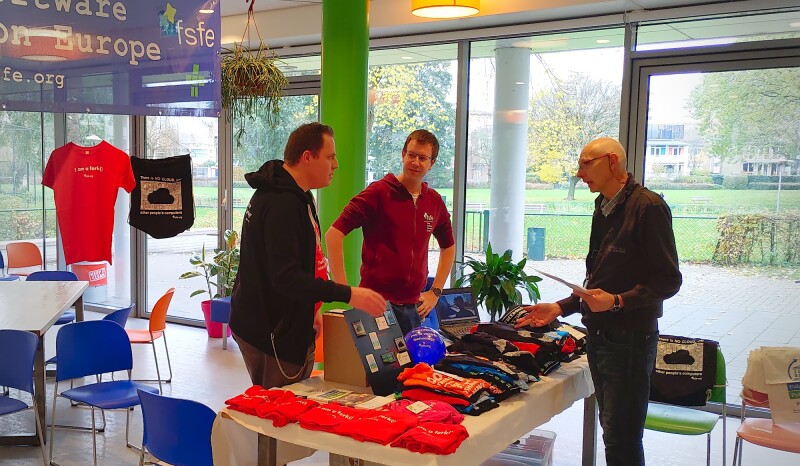
FSFE stand at NLLGG booth in Utrecht. The Netherlands, 2019.
What are your recommendations for others who want to start local
activities for the FSFE? Although the Netherlands FSFE country team
was already formed when you joined, could you recall
some of the early activities carried out there?
First, I think it is good to know what sets the FSFE apart from
other organizations. In the Netherlands, there are various other
groups with similar or even the same members, like a Linux user
group, a Debian community, the digital rights organization Bits of
Freedom. and multiple hacker spaces. Although at the FSFE we talk
plenty about technology, our focus at the FSFE is to inform the
general public and to bring about policy change. As a result our
community has a different aim than other Free Software related
communities in the Netherlands, and knowing the difference can help
you stand out and attract like-minded people. I don't know exactly
how it started in the Netherlands, but the behavior I typically see
with forming new groups is to start with like-minded people you
already know, announce your presence in related communities, and
then just start holding open meetings and let it grow from there.
Over the last few years, we did experience such a growth path in the
Netherlands. There was already a national group that communicated
via mail and chat, and we would have a booth and country team
meeting at the yearly T-Dose conference. Other activities were
organized mainly when the opportunity arose. We increased our
frequency of contact by having a stand at the bi-monthly NLLGG
meeting in Utrecht where some of our supporters would be present,
and we had the opportunity to meet like-minded people. The online
get-togethers let us spend more time to grow and align our local
group and cause plenty of people to join the conversation. Some
people joined for only one meeting, which I think is fine as
it was still a nice way to meet, and these relationships might be
helpful in the future. And from these conversations new ideas for
activities grew. Only recently we started having a more formal
agenda and minutes of our meetings as we'd often have more talking
points than time would allow.
Don't think our relative success is the straightforward execution
of an upfront well laid-out plan. Growing a community is very much
an iterative process based on learning and feedback. Our supporters
become active because they want to make a difference in the world,
and we have to find the ways that suit us best. Personally I like
to take things one step at a time, just make one change or do one
activity and see where it leads. In doing so, we have developed
our own way of doing things and have gained a lot of experience
with a variety of activities. Say we want to write a letter to
politicians, then we have some earlier work already lying around
for potential reuse, and we know already what support we can expect
from the FSFE Core team and what part we have to provide ourselves.
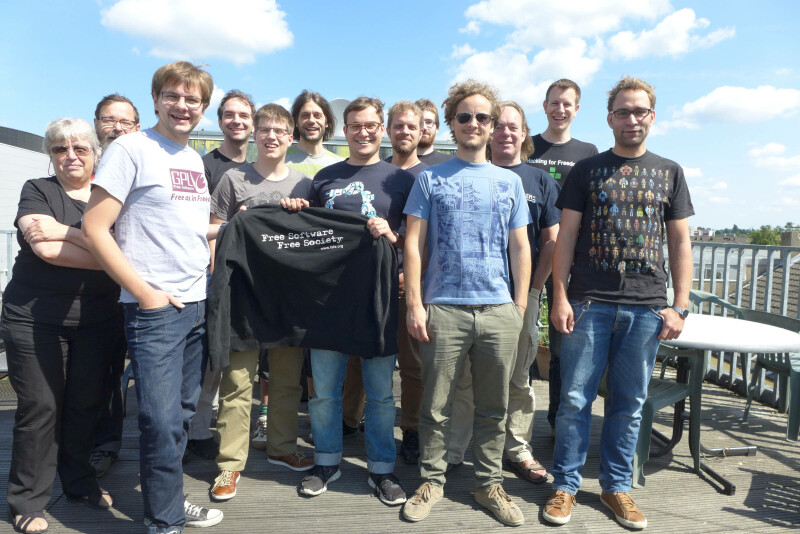
European Coordinators Meeting in Essen. Germany, 2015.
Don't think our relative success is the straightforward execution
of an upfront well laid-out plan. Growing a community is very much
an iterative process based on learning and feedback.
Our activities have been quite diverse. There is of course an
ongoing effort to translate information material. We wrote to
national and local politicians on multiple occasions based on
various developments and news articles. We took part in multiple
consultations on laws and policies and offered our expertise on
free software to government. We have had stands at the yearly
T-Dose conference and bi-monthly NLLGG meetings. We handed out FSFE
tool flyers in a university and a library. We gave presentations
about Free Software. We helped organize an Educational Freedom Day
and the SHA hacker camp. We organized a privacy café at Erasmus
University to educate media students about solutions to protect
your privacy. We hosted a Freedomvote for national elections. And
we were involved in the court case for the source code of Debat
Direct. From the diversity of topics and methods it is apparent
that activities were sparked from opportunity or interest by our
community members. The campaigns from the FSFE help us to
prioritize and link our efforts to a topic, but we don't feel
constrained to just the campaigns. I have found that politics
especially requires a strong organization because topics can become
big quite quickly. Ideally, you want to play into that attention
span and so you have to act fast. Also politics revolves around the
election cycles and so every couple of years you have to start all
over explaining to politicians why Free Software is common sense
and should be on their agenda.
How did you get involved in Free Software in the first place?
From a young age I spent a significant amount of time on the computer,
experimenting with various software also as a creative outlet.
Being a kid I mostly started out with gratis software that came
bundled with our computer or printer. With the arrival of unlimited
internet downloading, other software became an option. I learned
about the importance of open standards and access to software
because I had encountered situations where I could no longer open
my files as software had become unavailable due to operating system
incompatibility or the expiration of the trial duration. Using
various gratis software over time I found out that the Free
Software was generally the best, not having annoying advertisements
or spyware and generally being well-documented. I learned the value
of Free Software and Open Standards the hard way, from a practical
standpoint, and so it was not very explicit.
Once at the University studying Electrical Engineering, I learned
more about programming and how computers were built. But during
that time I also learned more about privacy and security and how my
privacy was actually being violated by a lot of services I was
using. Being technically educated it was clear to me that to
guarantee privacy and security in the long run you need control
over technology and so over the software you are using. Following
this reasoning led me to discover the philosophy behind Free
Software. The value of Free Software felt so logical at that point
I asked myself why I did not find out about it earlier. Not just
the practical implications of it, but also the philosophy behind
it. I felt that Free Software needed more promotion to the general
public and that is why I joined the FSFE, to support their effort
in promoting this common sense.

'We got a
call in the morning by Matthias Kirschner that we had to bring
'Bügel' (clothing hangers) to hang the T-shirts at the
stands. Normally Maurice and I could cope with the German we got
taught in secondary school, but this time it failed us.'
Can you tell us one of the stories that still warm up your heart
or that always makes you laugh or smile when you remember it?
I always have a laugh thinking back to the time I visited Open
Rhein Ruhr with Maurice in 2016. If I remember correctly, we got a
call in the morning by Matthias Kirschner that we had to bring
'Bügel' (clothing hangers) to hang the T-shirts at the
stands. Normally Maurice and I could cope with the German we got
taught in secondary school, but this time it failed us. Maurice
understood the world 'Bügel' to mean a clothing iron from
the conversation ("Bügeleisen"), assuming the T-shirts
were crinkled and had to be ironed. As Matthias had asked for two,
Maurice asked me to bring mine as well. So we both added our
clothing irons to the luggage and off we went. Only when we arrived
at the booth did we find out about the miscommunication and had a
great laugh about it. We took this memorable picture posted on the
blogpost
by Max Mehl.
As a last question, what do you wish the FSFE for the next 20 years?
I wish the FSFE will gain more active local supporters. I think the
FSFE stands out from other organizations with the topics it
addresses, and I would love to see each European nation have a
fruitful local group to table the topic on a national level. In a
world using mostly the same software and being bound by the same EU
directives, the foundation of our activities will probably be
similar in all countries. But each country comes with a different
language, different political system, different values and norms,
and various other differences. By having a strong local
representation, the FSFE can be 'united in diversity' (EU motto) and
be more effective in bringing about change. I also wish this
because I have a good time being part of the FSFE and a local group,
and I think there are a lot of like-minded people that would also
enjoy it. So I wish other supporters can be a part of a local group
and also experience the value of community.
I think the FSFE stands out from other organizations with the
topics it addresses, and I would love to see each European nation
have a fruitful local group to table the topic on a national level.
FSFE: Thank you very much!
For more by Nico Rikken, you can read his interview
focusing on technical aspects of Free Software and Free Hardware
such as sustainability and scaling. You may also be interested in
his blogpost on how
the Netherlands group grew in covid times.
About "20 Years FSFE"
In 2021 the Free Software Foundation Europe turns 20. This means
two decades of empowering users to
control technology.
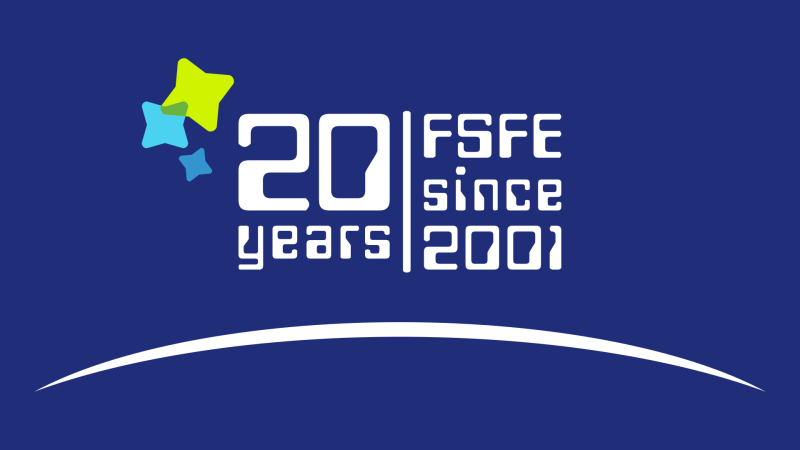
Turning 20 is a time when we like to take a breath and to look back
on the road we have come, to reflect the milestones we have passed,
the successes we have achieved, the stories we have written, and
the moments that brought us together and that we will always
joyfully remember. In 2021 we want to give momentum to the
FSFE and even more to our pan-European community, the community
that has formed and always will form the shoulders that our
movement relies on.
20 Years FSFE is meant to be a celebration of everyone who
has accompanied us in the past or still does. Thank you for your
place in the structure of the FSFE today and for setting the
foundation for the next decades of software freedom to
come.
Support FSFE
 Illustration by Sandra Brandstätter, CC-BY-SA 3.0 DE
Illustration by Sandra Brandstätter, CC-BY-SA 3.0 DE
 FSFE booth at T-Dose. The Netherlands, 2016.
Up until that evening my efforts in Free Software were a solo
effort and that changed in that evening. I became part of a larger
community of like-minded people, thanks to Felix.
FSFE booth at T-Dose. The Netherlands, 2016.
Up until that evening my efforts in Free Software were a solo
effort and that changed in that evening. I became part of a larger
community of like-minded people, thanks to Felix.
 Nico Rikken, FSFE Netherlands team coordinator, talks about
Nico Rikken, FSFE Netherlands team coordinator, talks about  FSFE spot in a non-profit hacker camp. The Netherlands, 2017.
FSFE spot in a non-profit hacker camp. The Netherlands, 2017.
 FSFE stand at NLLGG booth in Utrecht. The Netherlands, 2019.
FSFE stand at NLLGG booth in Utrecht. The Netherlands, 2019.
 European Coordinators Meeting in Essen. Germany, 2015.
Don't think our relative success is the straightforward execution
of an upfront well laid-out plan. Growing a community is very much
an iterative process based on learning and feedback.
European Coordinators Meeting in Essen. Germany, 2015.
Don't think our relative success is the straightforward execution
of an upfront well laid-out plan. Growing a community is very much
an iterative process based on learning and feedback.
 'We got a
call in the morning by Matthias Kirschner that we had to bring
'Bügel' (clothing hangers) to hang the T-shirts at the
stands. Normally Maurice and I could cope with the German we got
taught in secondary school, but this time it failed us.'
'We got a
call in the morning by Matthias Kirschner that we had to bring
'Bügel' (clothing hangers) to hang the T-shirts at the
stands. Normally Maurice and I could cope with the German we got
taught in secondary school, but this time it failed us.'

 Device neutrality principles
Device neutrality principles